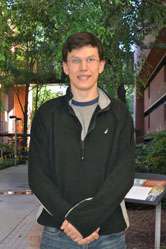Biological Sciences
“An Analysis of the Function of L24 in the Ribosomal Complex”

Catalysis of protein formation is performed by rRNA. However, ribosomes also contain a number of proteins, and, for most of them, their exact function in the ribosomal complex is unknown. It is possible that they assist in the assembly of the ribosomal complex or that they help change the rRNA’s conformation during translation. I will approach this question by examining a non-essential ribosomal protein (L24). L24 deletion mutants can grow, but the lack of L24 has an effect on ribosome efficiency. The aim of this project is to grow cells without L24, then turn on the production of L24 (using a bacterial plasmid), and follow the synthesis of the protein, its incorporation into the ribosome, the effect it has on growth rate and/or ribosome sedimentation rate, and the change in translation accuracy.
How did you find your mentor for year research project?
I had applied to quite a few different summer programs across the country and did not get in, so I talked with Dr. Lindahl of the UMBC Biology Department, and he was willing to accept me as a summer intern (summer 2012).
How did you know this was the project you wanted to do?
Honestly, at the time I applied, I did not know much about how research was conducted. I was more concerned with finding a way to get my foot in the door and to learn the methods necessary than about my project. In the end, I enjoyed it and have continued working on the project I started last fall.
Is this your first independent research project?
Yes, this is my first independent research project.
Do you get course credit for this work?
I do get course credit for this work (1 credit).
How much time do you put into it?
It really depends on the week, but on average I would say about 10-15 hours per week.
How did you hear about the Undergraduate Research Award (URA) program?
My mentor had mentioned it to me, and I looked it up and thought it would be great to have my project funded.
What academic background did you have before you applied for the URA?
I was a sophomore Biochemistry major at the time, so I was taking Organic Chemistry and Genetics. I had a solid foundation from high school and was able to not only complete my coursework but reach beyond and conduct research.
Was the application difficult to do?
No, the application was quite easy.
How much did your mentor help you with the application?
My mentor helped me significantly with editing and tailoring my abstract (and the scope of my project).
What has been the hardest part about your research?
The hardest part is always the failures. Especially in biology research when sometimes it takes a week or two to complete an experiment. Starting over, especially when you do not know what went wrong and have to troubleshoot can be painful. However, the rewarding feeling of accomplishment when that experiment finally works is incredible.
What was the most unexpected thing?
The most unexpected thing was the relaxed atmosphere in my lab. I always imagined a lab was a place with lots of people with white coats and masks who worked on a clock and didn’t talk much. I was so wrong! In reality, a lab is filled with regular people who just happen to also be passionate about science and research.
How does your research relate to your work in other classes?
There have been quite a few times when I was sitting in class and could barely contain my excitement because I was “learning” exactly what I had already done in lab that week.
What else are you involved in on campus?
I tutor at the Chemistry Tutorial Center.
What is your advice to other students about getting involved in research?
Find something that you can be passionate about. Something that you’d be willing to read a long, difficult paper about. And then pursue it with all you have. Find what’s worth that kind of effort.
What are your career goals?
I want to obtain an MD/PhD and conduct research while being a specialist and continuing to see patients.
12/12/2013